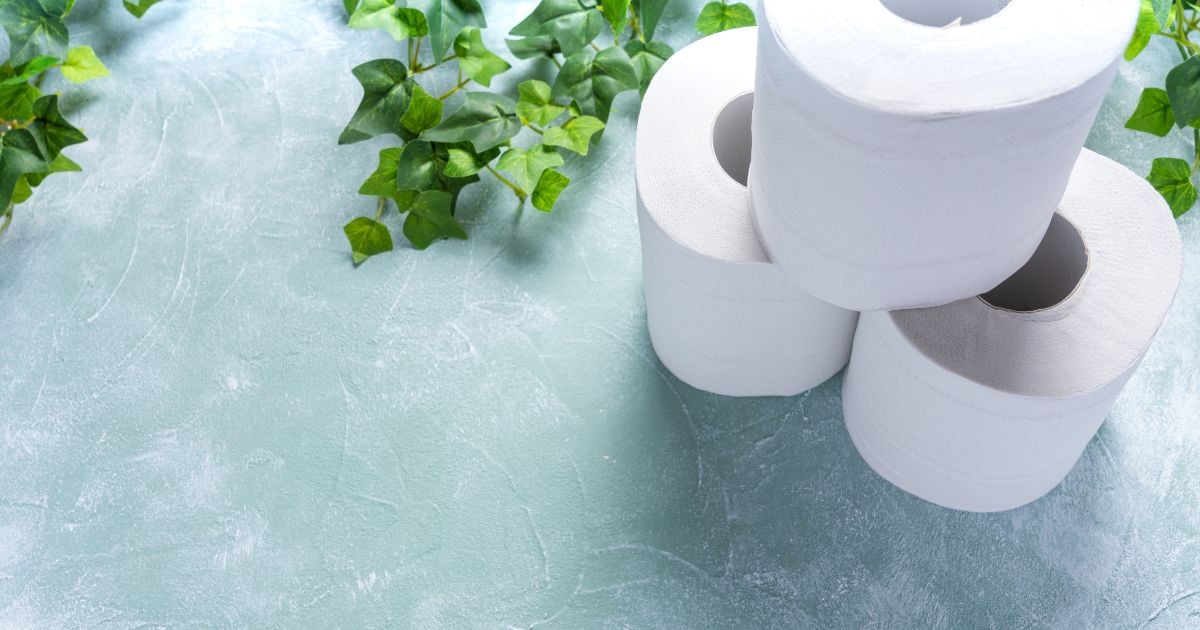Do your wiping habits matter?
Which toilet paper brands are the most ethical and sustainable? For the answer, see our Ethical Toilet Paper Comparison Table to compare brands’ ethical scores.
Why ethical toilet roll?
In the Western world, toilet paper is an essential household product that is purchased on a regular basis. It is therefore important to minimise the ethical and environmental impact of our loo roll wherever possible.
According to 89 Initiative, the production of toilet paper accounts for almost 10% of deforestation worldwide – the equivalent of 27,000 trees are flushed away every day! Deforestation not only harms animal habitats and the biodiversity of our planet, but also removes important tools for absorbing the carbon dioxide in our atmosphere. To limit global warming and fight the climate crisis, we must keep our trees standing by making toilet roll production more sustainable.
Additionally, some toilet paper brands use chlorine bleach in the manufacturing of their products – this is what gives our loo roll its bright white colour. Bleaching toilet paper is bad for the environment because it releases harmful chemicals into the air and water. In addition to releasing harmful chemicals, toilet roll bleaching also requires a lot of energy and water, which contributes to climate change and water pollution.
The most common type of bleach used in toilet paper is elemental chlorine bleach, which releases dioxins and other toxic chemicals into the environment. Dioxins are known to be carcinogenic and can cause a variety of health problems, including reproductive problems, developmental problems, and cancer. If you want to find unbleached ethical toilet paper, look for brands that received a top rating for Toxic Chemicals Policy.
Naked Paper, the first toilet paper brand to gain Ethical Accreditation, was set up to offer unbleached, natural bamboo toilet paper. Naked Paper is a great sustainable and affordable choice for anyone looking for a more ethical alternative to bleached white brands.
Toilet roll and plastic packaging
Another major concern with toilet paper is the use of plastic packaging around the products. By now, most of us are well aware of the detrimental impact of single-use plastics. Plastic takes hundreds (or even thousands) of years to decompose, harms wildlife, pollutes our waters and soil, and is not a sustainable material.
On the bright side, many loo roll brands are moving away from plastic packaging, instead opting for alternatives such as biodegradable materials or paper. This is a factor you may want to consider when looking for ethical toilet roll.

Sustainable toilet roll brands to look out for
Ethical concerns around toilet paper and household products in general are becoming more well-known. As a result, several new and innovative brands have emerged that are attempting to address the major sustainability issues within the toilet roll industry. This includes brands that are moving away from traditional paper materials to more sustainable and eco-friendly options.
Bamboo is widely considered a sustainable alternative to standard loo roll made from tree pulp, as it helps reduce deforestation. Bamboo is the fastest growing plant on earth, is highly renewable, and can grow by over a metre a day, unlike trees which take years or even decades to grow. Moreover, cultivating bamboo requires very little water and, according to several studies such as this one, bamboo releases 35% more oxygen into the atmosphere than trees, making it a highly sustainable choice.
If you want to try out bamboo toilet roll as an ethical alternative, we have some brands to suggest. There are a few high-scoring brands on our Toilet Roll Ethical Comparison Table which offer bamboo toilet paper, including Bumboo, Naked Paper, The Cheeky Panda and Who Gives A Crap.
Another eco-friendly option that’s becoming more popular is recycled toilet roll, made from materials such as magazines, office paper and cardboard. In the production of recycled loo roll, no deforestation occurs and significantly less water and energy are required. This means that recycled toilet paper tends to have a lower carbon footprint, making it more ethical and sustainable than traditional loo roll.
You can find recycled toilet paper offered by Feel Good, Naked Paper, Serious Tissues and Who Gives A Crap. We can reassure you that all these brands receive an excellent GSG ethical score in our table.
Avoiding the nasties: which toilet paper brands to to steer clear of
Unfortunately, there are some toilet paper brands which are owned by unethical companies but checking our Toilet Roll Ethical Comparison Table before you buy will help you to choose an ethical brand.
The lowest scoring brands in our toilet paper research are Andrex (owned by Kimberly-Clark Corporation), Cushelle and Velvet (both owned by Essity AB). Kimberly-Clark and Essity both allow their products to be tested on animals in countries where it is legally required, resulting in a bottom rating for Animal Welfare. Many ethical companies choose not to sell their products in countries where animal testing is mandatory to avoid unnecessary animal cruelty.
Additionally, due to their parent companies, Andrex, Cushelle and Velvet have been criticised for involvement in a range of unethical activities, such as workers’ rights abuses, environmentally harmful products and price fixing. Andrex has even received a bottom rating in the Public Record Criticisms+ category, which is only applied in severe cases where companies have received a high volume of criticisms. If you are keen to purchase ethical toilet paper, we recommend avoiding these three brands.
The following brands have been evaluated and investigated by The GOOD Shopping Guide. To learn more about toilet paper companies’ corporate ethics and sustainability practices, simply click on the brand names listed below:
Bumboo, Naked Paper, Serious Tissues, The Cheeky Panda, Who Gives A Crap, Feel Good, Nicky, Regina, Renova, Cushelle, Velvet and Andrex.